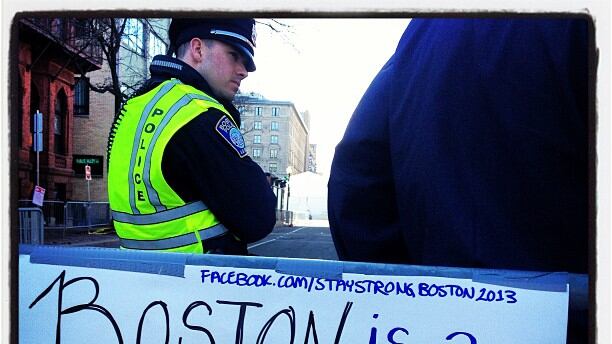The phone started ringing. Nonstop. The only call I clearly remember, as I scurried to find a quiet place on a busy New York City street, was the one from my husband.
“They bombed the marathon,” he said. At first, the words didn’t register, at all. “You have to go, Kerry. You have to go.” So, I went.
I connected with my managers at Channel 2 and without hesitation I agreed to drop my vacation and go home to Boston. Whatever I had planned in New York that week took a back seat.
Questions raced through my mind, "What happened? Why? How badly were people injured? Was anyone killed? Where is my family?" as I simultaneously raced from Manhattan to Brooklyn to pack my stuff and get to the airport.
Every traffic light felt like an eternity. I will forever be grateful for the patient taxi driver who could clearly sense my panic.
I arrived at JFK airport. Within minutes, all flights to Boston were grounded. Naturally, I learned this only after I checked my bag. My boss and I talked and decided it would be best if I drove. And so began the tedious process of unchecking my bag, another anxious eternity.
Finally, I got my luggage, found my rental car and off I went. There was no eating, no rest stops, no stopping. I was headed home, unsure of what I would find.
After four hours across I-90, I arrived in a city that I barely recognized. The Boston I knew on ‘Marathon Monday’ was transformed into a military state. Typical vibrant streets were locked down, surrounded by heavily armed National Guardsmen. Blue lights flashed around every corner. Helplessness. Despair. Anger. Off to the hotel.
Thankfully, the station assigned me to work with best possible partner that day, my husband. He’s not from Boston, but he’s one of the few people who truly understand how much my hometown means to me. He had flown up from Atlanta. We met up at the hotel around 11 that night. Even though our shift the following morning began at 3am, we barely exchanged a hug before we headed out the door to start work. Emotion had to take a back seat to the job at hand.
We met runners from Atlanta, who generously shared how they experienced the moments the bombs went off. They shared their close calls, their shock, their pain, their fear. Some of those very people have become dear friends.
Two hours of sleep, the alarm. Time to pull it together for the morning show that starts at 4:30 a.m. My job, try to encapsulate the mood and share the emotion surrounding the scene.
I was surrounded by fellow journalists from around the world. All of us lined up somberly reporting on what many of us still couldn’t comprehend.
When the sun came up, reality set in. I’ll never forget the images of a popular cafe completely abandoned. You could feel the moment the people sitting, enjoying lunch, heard the bombs and just ran.
As the hours and days ticked on, the investigation forged ahead. Suspects were identified. A search was underway. Slowly, fear in the streets was replaced by resolve. There wasn't one particular moment when the emotional tide shifted; it came as a gradual swell of determination to seek justice for the dead, the wounded, the runners, the spectators and the city.
Somewhere along the way a new expression was born, “Boston Strong,” and it’s stuck. I love it. It says it all.
I eventually returned to Atlanta, proudly spouting my new favorite tag line. I think it will be evident to all who attend the Boston Marathon this year.
35,660 runners will attempt to cross the finish line, thousands more than last year. They will be surrounded by supporters along the 26.2 mile race route and across the country.
They will have one very big supporter in Atlanta.
WSBTV





